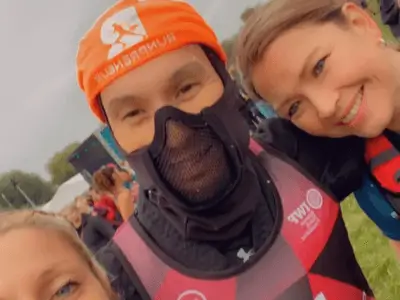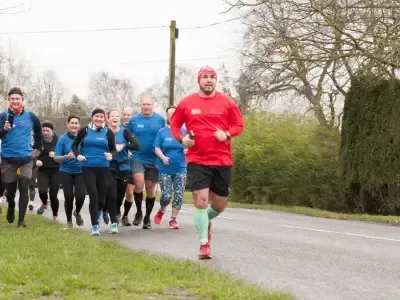Runpreneur Journey Blog
Embark on an extraordinary journey with the Runpreneur community. Discover inspiring stories, insider tips, and the transformative power of our global challenge. From first-time runners to seasoned athletes, our blog captures the essence of the Runpreneur movement, inspiring others to join the cause.

The Power of an Accountability Group: My Recent Experience
The Power of an Accountability Group:
My Recent Experience
As part of my journey to day 1564 of consecutive run vlogging, I recently joined a business mastermind group—or perhaps more accurately—an accountability group. Today, I want to share my experience, the lessons learnt, and the strategies to ensure you get the most out of similar events in your own life.
Understanding Time as a Finite Commodity
First and foremost, it's crucial to scrutinize any meetings or events we attend, especially those demanding our precious time. Time is a finite resource, and we must be vigilant in ensuring a return on our investment. By attending business mastermind or accountability groups, you should not only reclaim the time spent but also secure worthwhile insights, ideas, and connections.
Choosing the Right Group: Values Over Personalities
The foundation of an effective group meeting begins with shared values. While it's beneficial to have diversity in personalities, the core values among the group should align. I found this particularly true with my group, comprised of individuals I met during a business skiing networking event. Despite our differing personalities, our shared values allowed us to pull in the same direction and gain different perspectives on business and life challenges.
The Importance of Structure
An easy pitfall for any group meeting is the tendency for small talk and tangents to take over. To combat this, we established a robust structure rooted in Dr. John Demartini's "Seven Value Areas of Life." These areas—spiritual, financial, vocational, social, mental, and physical—provide a holistic framework that extends beyond just business topics. We wanted accountability for not just our business actions but for our overall life balance.
Accountability: The Cornerstone
Within our structure, we had a session of questions and answers where two members delved into the challenges faced by the other members. This approach resulted in actionable steps, which is where accountability comes into play. We set quarterly meetings to review our progress and hold each other accountable. One crucial tool for this is having someone take detailed notes and summarize actions using a collaborative piece of software like Mind Node. This ensures everyone is on the same page and can track progress effectively.
The Need for Social Debriefing
Finally, after the intensity of the structured accountability session, we scheduled a more relaxed social debrief, featuring food and drinks. This allowed us to unwind and engage in personal small talk, strengthening our interpersonal relationships, which is also vital for a supportive network.
Key Takeaways for an Effective Accountability Group
Shared Values: Select a group with aligned values. It's about belief systems more than similar personalities.
Structured Meetings: Establish a clear structure for your sessions. Dr. John Demartini’s "Seven Value Areas of Life" provided an effective framework for us.
Actionable Notes: Assign someone to take notes and capture all action points. Use a collaborative tool to share these with the group.
Regular Accountability: Schedule follow-ups and hold each other accountable. Quarterly meetings worked well for us.
Social Downtime: Incorporate a relaxed, social element to build personal relationships, which are just as important as professional ones.
In conclusion, my first accountability group meeting was a success, but the true measure will be the progress we’ve made when we reconvene in the next 90 days. I highly recommend forming or joining such groups if you’re looking to push your business and personal life forward in a structured and accountable manner.
Thank you for being part of my journey. If you believe in my mission of saving children’s lives through my ultimate ultramarathon run-vlogging project, do give this blog a share, like, and comment. The more people we reach, the more lives we save. Until next time, stay positive and stay happy!
Stay tuned for more updates on my daily journey—see you tomorrow!
Kevin Brittain

Kevin's 40,075km Challenge: Raising £1 Million for Children
Meet Kevin, a dedicated Runpreneur who embarked on an extraordinary journey to raise £1 million for children in need. Over the course of his 40,075km challenge, Kevin's unwavering determination and passion inspired thousands to join the Runpreneur movement.

Runpreneur Vlogging: Capturing Kevin's Journey
Experience the Runpreneur challenge through the lens of Kevin's video diary. Witness his ups and downs, the camaraderie of the community, and the transformative power of running for a cause. Dive into the visual stories that capture the essence of the Runpreneur movement.

Empowering Children, One Step at a Time
As Kevin logged every kilometre of his 40,075km challenge, the true purpose behind his journey came into focus. Each step, each bead of sweat, fuelled essential healthcare, education, and nutrition programs for children in need around the world.

The Transformative 4x4x48 Challenge
Experience the thrill and personal growth of our iconic 48-hour running event. Witness the determination and resilience of Runpreneurs as they push their limits, one mile at a time.

Runpreneur Vlogging: Capturing the Journey
Dive into the visual stories of our Runpreneurs as they document their experiences through engaging video logs. Witness the challenges, triumphs, and moments of camaraderie that define the Runpreneur spirit.













